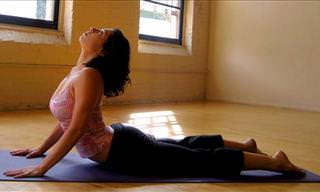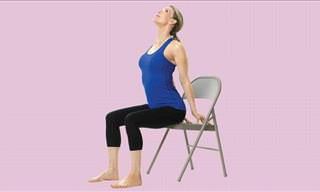While nothing beats a massage, I absolutely love using tennis balls to ease nagging aches and pains. They get into those tight areas almost as well as a pair of human hands, reaching into the deepest layers of muscle and connective tissue, enabling your muscles to fully contract and stretch. This series of mini self-massage techniques, from yoga teacher Jill Miller's new book, The Roll Model, will help relieve soreness, pain and increase circulation. So grab a pair of tennis balls and get started.
1. Soothe Achy Feet
Using a ball for self-massage loosens up stiffness in your sole's muscles, joints and connective tissues.
Here's How:
• Rest your hand on a wall or chair for support. Place the ball under the arch of your foot, keeping your heel on the floor and allow your body weight to sink in.
• Roll your foot from side to side, enabling the ball to cross your arch. Continue with this movement for one or two minutes.
• Then roll the ball along the length of your foot, moving it from your heel to your toe. Continue with this movement for one or two minutes. Then repeat both movements (across and along) using the other foot.
2. Soothe Achy Knees
Using a ball gently pulls the lower leg bones, kneecap, and thigh away from one another, providing an internal stretch within the knee.
Here's How:
• Sit on a chair, placing the ball behind your bent knee (as close to the side of the knee as possible).
• Contract the muscles against the ball, squashing the ball for a count of 10, relaxing your muscles for a count of 10. Repeat eight to 10 times, then repeat on the other knee.
3. Soothe Tight Thighs
This movement will help soothe tight knees and hips at once.
Here's How:
• Sit on the ground and place two balls on the outside of your thigh, keeping the balls nestled into the side of your thigh. Slowly bend and straighten your knee 20 times.
• Then move your thigh from side to side, allowing the ball to move across the side of your thigh. Perform the movement for a total of two minutes. Then repeat on the other side.
4. Soothe Sore Hips
Large and small muscles, connected to the side of the hips are targeted in this simple move, including the gluteus maximus, the medius, and the piriformis. These muscles generally become tight from sitting too much, wearing high-heeled shoes or being overused in exercise.
Here's How:
• Lie on the ground and place one ball on the side of your hip, leaning into the ball.
• Then make slow circles with the hip and leg as it rests on the ball, circling 12 times in each direction. Repeat on the other side.
5. Soothe a Cramped Back
A fantastic way to massage and relieve tension in the back and core muscles.
• Place two balls at the arch of your spine, between your bottom and your ribs, lying down on top of them. Maintain deep breathing, shifting your pelvis from side to side, allowing the balls to cross your entire lower back. To keep the balls from moving out, place them in a stocking or sock.
• In the areas where you feel most stiff, move the balls more slowly, lifting the pressure at the spine, so that you do not feel the balls pinched against your bones. Repeat for a total of five minutes.
6. Soothe Bad Posture
This move not only combats bad posture, it relieves upper back tension and helps revive your breath.
Here's How:
• Lie down and place two balls side by side on either side of your upper back. Then interlace your hands behind your head, lifting your head off the floor, bringing your chin toward your chest. Keep your bottom lifted off the floor and take three deep breaths into your ribs.
• With a steady breath, roll the balls like a rolling pin up and down your upper back for three to four minutes.
7. Soothe a Tight Chest
This move will help release tension in the over-worked chest muscles that frequently tighten due to holding cell phones, typing on computers, cooking or carrying kids. It also helps restore breathing and relaxes the nervous system.
Here's How:
• Lean against a doorway or wall corner and place a ball just below your collarbone. Breathe into the pressure of the ball, maintaining this exercise for one minute.
• Then shift from side to side, allowing the ball to scroll along the upper chest. Breathe into the ball for one to two minutes.
• If possible, move your arm and your neck while you shift from side to side, adding extra shoulder mobility into the mix. Continue for another minute, then repeat on the other side.
8. Soothe Tense Shoulders
Soothe the rotator cuff muscles that tend to tighten due to overuse, poor posture and repetitive motion.
Here's How:
• Lie on the floor and place a ball behind your shoulder blade. Move your shoulder in every direction for three minutes on each side.
9. Soothe Tired Hands
Our hands are often overworked from day-to-day activities. This move helps to relieve extra tight flexor muscles of the hand.
Here's How:
• Sit on the floor or stand at a table. Place your hand on top of a ball and your other hand on top to apply more pressure. Squash the ball, leaning your body weight into it, holding the ball steady for one minute while breathing deeply.
• Move the ball from side to side and then up and down, creating an asterisk shape as you roll it across the palm. Repeat this motion for two to three minutes, then repeat with the other hand.
10. Soothe a Stiff Neck
The suboccipital and erector muscles, responsible for keeping your head staring at your computer screen all day, may get stiff and tight. This move helps to relax these muscles and is especially useful before sleep.
Here's How:
• Place two balls side by side under the base of your skull. You may put the balls in a stocking or sock for extra support. Breathe while you rest for one minute.
• Gently nod your head 'yes', allowing the ball to nestle into the back of your neck. Hold for 1 minute. Then pivot your head from side to side, as if saying 'no'. Continue for one minute.
• Pivot your head to one side, remaining there and nodding several times. Pivot your head in the opposite direction, nodding again. Alternate back and forth for one to two minutes.
Source
Images: J. Miller
 Go to BabaMail
Go to BabaMail





























































